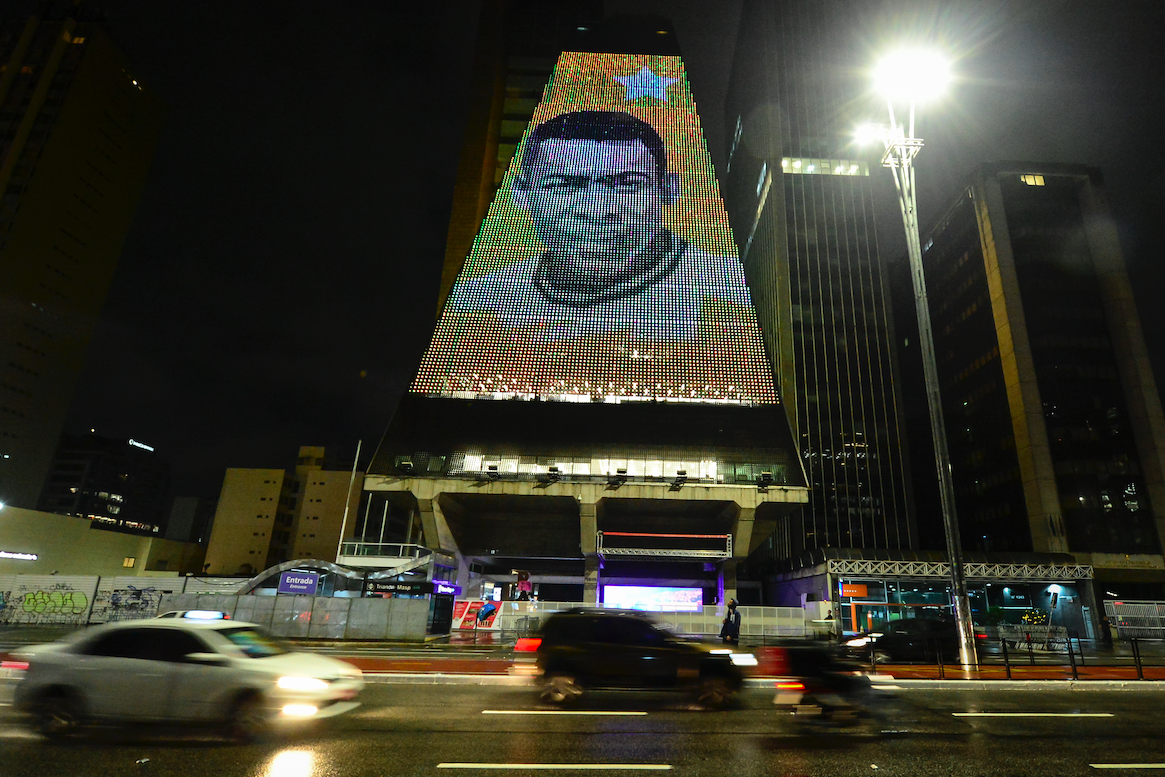Netherlands manager Louis van Gaal’s tactical moves are under more scrutiny than ever. Not just because the Dutch manager has reached the semifinals of the World Cup. As the new manager of Manchester United, his style has been dissected ad nauseum so that folks can get a sense of what type of manager the world’s most distinguished and lucrative football club has poached.
One thing that can be surmised is Gaal is extremely bold and somewhat cocky That's no surprise though. However, nobody saw what he did Saturday coming. During Saturday’s snoozefest against Costa Rica, the van Gaal pulled goalkeeper Jasper Cillessen in the 120th minute to replace him with Tim Krul. It was the first time a goalkeeper had gotten the hook in the 120th minute of a World Cup match.
Heading towards penalty kicks, the move was even more perplexing given that Krul had only saved 2 of 20 penalties during his tenure at Newcastle.
So how did Krul manage to overcome his inadequacies as a penalty goalkeeper? By playing mind games with Costa Rica’s penalty takers.
Video showed Krul walking to one side of the goal post during his pre-kick routine, boorishly attempting to verbally intimidate whichever Costa Rican was set up to take the penalty and then dove to the opposite goalpost.
It was reverse psychology that was so crazy, it actually worked. Needless to say that after the attention it received, he probably won’t use that strategy again.
However, European media has stirred up a tizzy over Krul’s intimidation methods. Krul never physically threatened anyone, but his bravado appeared to offend the sophisticated sensibilities of many European media outlets.
Therein lies another subtle difference between American sports and European athletics. Trash talk is ingrained in our sports DNA. What seemed like an innocuous form of gamesmanship has been painted as an example of vulgar antics unbecoming of a pro football player.
Next up, the Netherlands prepares to receive the consummate footballer when Lionel Messi and an Argentinian side that has been reliant on its talisman at nearly every stage of this tournament. One thing is for certain, those tactics won’t have an effect on Argentina’s Messi-ah. Yet despite delivering four goals and assisting on another in a 1-0 win over Switzerland, some believe this has been a disappointing tournament for Messi.
One thing American and European media have in common is their insistence on using past sporting legends as the narrative means of showering unwarranted criticisms upon world-class athletes.
His goals haven’t been spectacular on the level of Maradona's grainy '1980's World Cup runs and thus, Messi is measured on an unfair scale. Perception isn’t always reality.
While superstar players have been knocked out like Ronda Rousey pay-per-view opponents, Messi has been playing superhero for Argentina, exhibiting resiliency and creative improvisation skills while spawning opportunities for teammates despite getting roughed up by challengers kickboxing with his lower body's valuable golden limbs.
Messi’s goal scoring exploits are well-known from continent to continent, however, his passing is somewhat overlooked as a result.
"I think Messi played really well, it’s not just about scoring goals, it’s about having possession of the ball, attracting three opponents and then giving the ball to a team mate in an advantageous position," Argentina manager Alejandro Sabella told reporters.
"Each time he gets the ball, it represents hope for all of us and a threatening situation for our opponents. Regardless of whether he scores goals or not, his influence is decisive.” Sabella added.
Messi assisted Angel Di Maria on the match-winning goal in the 118th minute against Switzerland. And the man is arguably the best through ball passing forward in the world launched an awe-inspiring through ball that threaded the needle against Belgium, before bouncing into the path of a streaking Di Maria.
No goal was scored on Messi’s pass this time around, but the impact of Messi’s vision and foo-eye coordination was apparent in a pass that not many other footballers could have executed.
With Di Maria out for the semifinals nursing a thigh injury, Argentina will be even more reliant on their deux ex machina to vault them into an unlikely World Cup Final against either Brazil or Germany.
Lifting Argentina to the World Cup semifinals for the first time in 24 years has been the pitch equivalent of LeBron James catapulting the Cleveland Cavaliers to the 2007 NBA Finals. As if we needed further proof that Messi is the LeBron of his sport, the man, the flawed myth, the incomplete legend himself also praised Messi—for his passing skills and somewhere Skip Bayless’ or his European analog began jotting down derogatory nicknames for Messi.
Heard Messi made the game winning pass! That's my type of play/er. Win, loss, draw u make the right play to help your team be successful
— LeBron James (@KingJames) July 1, 2014
Even without Di Maria, Argentina is amongst the lucky ones. Brazil will hobble into their match against Germany on the opposite end of the bracket without its phenom Neymar and captain Thiago Silva.
Neymar’s fractured vertebrae in the 88th minute of the Seleção win over Colombia eliminated three of the World Cup’s brightest stars (including James Rodriguez and Juan Cuadrado) in one fail swoop.
Neymar is expected to take approximately six weeks to recover, although to remain cautious about his future back health, expect that time frame to gradually increase. Injury treatment has advanced exponentially in the last 15 years, but contrary to reports, there is no procedure, experimental or theoretical can heal Neymar in time for next Sunday’s World Cup Final. Short of finding the miracle worker that repaired Bruce Wayne’s back inside The Pit, Neymar is done and life goes on. In Neymar’s place, Brazil will have to place a pawn into the young South American football king’s spot in the lineup.
From what’s been made apparent, 25-year-old, Chelsea midfielder Willian is the favorite to get the start over Bernard in the semifinal on Tuesday.
Yet, in a bit of a twist, Willian also provided the Brazilian side with an injury scare after suffering a back injury in training that could have his start in doubt.
Willian won’t be relied upon as heavily as Neymar was on the pitch for Brazil. That responsibility will likely fall onto Oscar.
Alongside Neymar, Oscar is the other youthful prodigy on the Brazilian side. However, Oscar operates as more of a facilitator creating opportunities for the striker than as a goal-scoring striker. In the battle of South America vs. Europe, Argentina and Brazil are thoroughly outmatched in experience and talent by their respective opponents in the Netherlands and Germany.
Of course, the minute Spain was eliminated, this was the only conceivable outcome to this World Cup.
During Spain’s reign, the Dutch and Germans have been the perennial bridesmaids. Germany has lost to the eventual champs in the finals or semifinals of the UEFA Euro 2012, the 2010 World Cup, the UEFA 2008 tournament and the 2006 World Cup, held in Germany.
Eight years after their crushing loss to Italy, the ungrateful visiting Germans will be in position to return the favor and snatch the air from underneath the host team’s feet, just before the finish line.
On the German side, a victory could be Thomas Muller’s coronation into the upper-tier of modern footballers with elite goal-seeking skills. The World Cup’s reigning Golden Boot and Best Young Player winner has only three goals and a pair of assists in this tournament, but is aiming to add the more prestigious Golden Ball award, for best player in a World Cup Final to his trophy collection. Germany has the simplest path against a bruised and battered Brazil, but where there is Messi, there is always hope for Argentina and consternation for opponents.
Muller, Robben, Robin van Persie and Miroslav Klose are brilliant, but Messi is transcendent.
As Sabella eloquently stated in the aftermath of Argentina’s win over Belgium, “When you have a player such as Messi, who never, or almost never, loses the ball, it’s water in the desert and not just when he scores.”
Legends are made and debunked as the teams are whittled down from 32 to 4 to 1. Rarely is the world’s best player in position to play spoiler like Messi is.
If Messi does slay the Netherlands on Wednesday, the Germans will likely be waiting on Sunday.
It could be sweet retribution for Messi and Argentina, which was sent packing prematurely by Germany in South Africa four years ago. Between that day and Argentina’s 2014 opener against Iran, Messi was roundly criticized for going silently into the night without logging a single goal in four matches.
The pain was exacerbated by the lingering shadow of his coach in 2010 — Maradona. To put it crudely, Maradona’s football legacy haunts Messi like His Airness’ specter hovers over James like a dark cloud on bright, sunny days.
Twenty-eight years ago, Maradona's "hand of god" lifted Argentina past England into the semifinals. His modern contemporary is the Messi-ah seeking to Rapture a common squad into eternal football firmament .
Maradona faced a different breed of pressure when he led Argentina to the ’86 World Cup mountaintop in Mexico City. Because of the superior talent Argentina surrounded Maradona with on the pitch that year, the expectation going in was that they’d win.
Messi faces longer odds securing his legacy as an outright underdog with Argentina running with European wolves. But never forget that every dog has its day.



